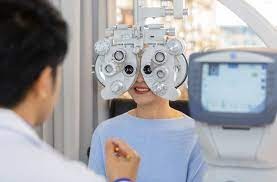Arizona's Vision Eye Care Center
Opening Hours
Mon-Thu: 9:00AM - 6:00PM Friday: 8:00AM- 5:00PM
Our Location
15215 S. 48th Street #180 Phoenix, AZ 85044
Call NOW
What Part of the Eye Exam is Not Covered by Medicare?
Medicare does not cover routine eye exams for eyeglasses or contact lenses. These basic vision checks are excluded from Original Medicare coverage. Many seniors in Phoenix face unexpected bills after eye appointments. Vision care costs can add up quickly for those on fixed incomes.
Arizona's Vision Eye Care Center understands these Medicare limitations. Our team has helped thousands of seniors navigate confusing coverage rules for eye care services.
This article explains exactly what Medicare covers and doesn't cover for eye exams. You'll learn your options for getting affordable vision care despite these gaps.

What's Not Covered by Original Medicare (Part A & B) for Eye Exams
Original Medicare excludes several common vision services. These gaps leave many seniors paying out-of-pocket for basic eye care needs.
Routine Eye Exams
Medicare does not cover routine eye exams (eye refractions) for eyeglasses or contact lenses. These standard vision checks measure your prescription needs. Patients must pay 100% of these costs themselves. Most seniors need these exams annually to maintain proper vision correction.
Eyeglasses and Contact Lenses
Original Medicare does not pay for eyeglasses or contact lenses except after cataract surgery. Your prescription glasses and contacts are your responsibility. The average out-of-pocket cost for vision services is about $230 for Medicare beneficiaries.
What Is Covered by Original Medicare (Part A & B) for Eye Exams
Medicare does cover certain medically necessary eye services. These benefits focus on specific health conditions rather than routine vision care.
Diabetic Eye Exams
Medicare covers annual diabetic eye exams if you have diabetes. These specialized tests check for diabetic retinopathy. Medicare pays 80% of approved costs after you meet your Part B deductible.
Glaucoma Testing
Glaucoma screening covered for high-risk patients only. You qualify if you have diabetes, family history of glaucoma, or are African American over 50. Medicare covers one test yearly for eligible patients.
Macular Degeneration Diagnostic Tests
Macular degeneration tests and treatments partially covered by Medicare Part B. This includes diagnostic tests and certain treatments. The program covers 80% of approved costs after your deductible.
Cataract Surgery and One Pair of Corrective Eyewear After Surgery
Cataract surgery and related lens placement covered by Medicare. This includes one pair of glasses or contacts after surgery. Standard frames with basic lenses are typically covered.
Exams and Treatments for Injuries or Other Eye Diseases
Medicare covers eye exams for medical conditions and injuries. Treatment for conditions like conjunctivitis or eye injuries receives coverage. Your doctor must document medical necessity.
Covered Eye Services Under Medicare Part B
Medicare Part B provides coverage for specific eye-related medical services. These benefits apply when certain conditions are met.
Diabetic Retinopathy Exams
People with diabetes can receive yearly eye exams. Medicare covers these specialized tests to prevent vision loss. Your doctor must document your diabetes diagnosis.
Glaucoma Screenings (High-Risk)
Annual screenings are covered for high-risk individuals only. You must meet specific risk criteria. The test includes eye pressure measurement and visual field assessment.
AMD Tests and Treatments
Medicare covers eye exams for diabetic retinopathy only as a full exam. For AMD, specific diagnostic tests receive coverage. Treatment options like certain injections may be covered.
Cataract Surgery & Post-Op Eyewear
Surgery to remove cataracts receives Medicare coverage. One pair of standard eyeglasses after surgery is included. Upgrades to premium lenses require additional payment.
Routine vs. Medical Eye Exams (Why Bills Differ)
Understanding the difference between routine and medical exams helps explain coverage gaps. This distinction determines whether Medicare pays for your visit.
Refraction vs Diagnostic Testing
Routine vision correction exams not covered by Medicare include refraction tests. Diagnostic tests for medical conditions receive coverage. Refraction specifically measures your prescription needs.
Medicare Billing Pathways
Eye doctors bill differently for routine versus medical exams. Medical exams require diagnosis codes for coverage. Routine exams use vision benefit codes not recognized by Medicare.
Common Surprise Charges
Many patients face unexpected bills for refraction services. This test often appears as a separate charge. Always ask which services Medicare will cover before your exam.
How to Get Coverage for Routine Eye Exams
Several options exist to fill Medicare's vision coverage gaps. These alternatives can help reduce your out-of-pocket costs.
Medicare Advantage Plans (Part C)
Medicare Advantage may offer additional vision benefits beyond Original Medicare. Many plans include routine eye exams and allowances for glasses. Coverage varies by plan and location.
Vision Plans
Standalone vision insurance plans provide additional coverage. These plans typically offer annual exams and eyewear allowances. Monthly premiums range from $10-25 in Phoenix.
Your Options if Medicare Won't Cover Your Eye Exams in Phoenix
Phoenix seniors have several options for affordable eye care. Local resources can help reduce vision care costs significantly.
Arizona's Vision Eye Care Center offers senior discounts on non-covered services. We provide clear cost information before your appointment. Our team helps maximize your existing benefits.
We understand Medicare's complex coverage rules for eye care. Call us today to learn how we can help with your vision needs.

Looking for top eye care in Phoenix? Our expert optometrists provide quality vision exams, glasses, and contacts. Book your appointment today!